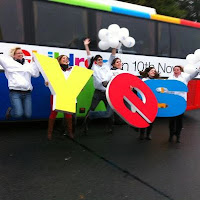The Children’s Referendum has been passed by a majority of
the minority who turned out to vote. Good luck to it, but it’s hard not be
deeply cynical about what all this amounts to in real terms, if anything at
all.
The sovereign people are being castigated – again – by the commentariat
for a low-turn out in the referendum. But it’s not hard to understand the low
turnout at all. Vincent Browne castigated the referendum as "mainly a stunt" in
the Irish Times but, reluctantly, decided to go with a Yes vote. Did most
people find the thing equally watery, and therefore decided to pass on it? It
seems the most likely scenario.
The Government should be grateful – voting No in cases of
doubt is a more civic-minded strategy than abstaining. Your correspondent went
one step further than Browne and voted No, and is sorry more didn’t. The Irish
political establishment badly needs a slap into reality, and this was a chance
to deliver that slap.
An idea developed in Irish public life that Ireland must
have a Children’s Referendum. Over twenty years, this gained the status of Received
Wisdom. A parallel understanding of what that Children’s Referendum would specifically
be about did not evolve with this Received Wisdom, so people filled in the
blanks as suited their own agendas at a particular time. It was all very high
on ideals and light on specifics.
This is problematic because Ireland’s is a protective,
rather than an aspirational, constitution (a distinction you can read more about
here). This means that a lot of blather about protecting children and
children’s rights is never going to be more than blather. Proposals must be
specific and able to withstand legal challenge. Vague generalities just don’t
cut it.
At first, it looked like Children’s Minister Frances
Fitzgerald had steered an expert path through extremely choppy seas. For years,
the commentariat looked forward to the Children’s Referendum as another Ypres
or Passchendale in the culture war as DeValera’s Ireland crumbles and Fintan
O’Toole’s Ireland is being built. But when the wording was finally announced
there was: silence. Absolute and deafening.
There was no credible opposition to the Children’s
Referendum. None. The Catholic Church gave the wording its blessing and all the
parties in the Dáil called and campaigned for a Yes vote. Fitzgerald had a
potential political triumph on her hands. How could a landslide not be
inevitable?
And yet it wasn’t. The more people looked at the referendum
campaign the more they struggled to find what it was the thing actually did.
The referendum would “protect children’s rights,” we were told. But protect
how? Which children? Which rights? In what way would the abuses of the past
forty years not have happened if this amendment were in the constitution
originally? It was all maddeningly unspecific.
There was the “small step” argument, that the passing of
this referendum would unlock a door that would lead to a torrent of legislation
that would safeguard children in danger and build a brighter future for all.
But everybody knows that the country has no money. The country can’t provide current
services, without signing up for a raft of new ones.
The one specific in the referendum campaign had to do with adoption.
If the referendum had been called the Adoption Referendum would it have
attracted a bigger turnout and a stronger majority? Even though the No side,
such as it was, concentrated their arguments on the notion of the family, the
reality is that the family has undergone profound redefinition since the
sovereign people passed the Irish constitution seventy-five years ago.
All a citizen need do is pass an unhappy hour at Abbey or
Jervis Luas stops in heart of the nation’s capital city and he or she will need
no further convincing that there are children in this state whose parents are
no more capable of raising them than they are of raising the dead.
But no. A small victory on adoption was beneath the government’s
aspiration. They wanted to promote full duck Children’s Rights Referendum and
were then astonished when people saw past the red-haired little girls and
weeping little boys to a whole heap of nothing.
So whether the referendum was passed or shot down really
didn’t matter. Nothing will change. The whole thing was an exercise in the
tokenism that Irish public life specializes in.
The reward for the
political parties now is that Labour can return to their core voters and say
look, we have delivered on a bedrock principle, while the rest of the parties
sigh a sigh of relief that this damnable thing is finally done with and nobody
will wreck their heads about it for a generation at least.
Next up on the reform agenda is the Constitutional Convention, where the pressing issue on which Ireland holds her breath is
whether the Presidential term of office should be reduced to five years or
remain at the current seven. One feels the foundations of the state tremble at
the thought of change, real change, change we can believe in.
We are where we are. At the airport, leaping on planes to
get the hell away from this madness.





